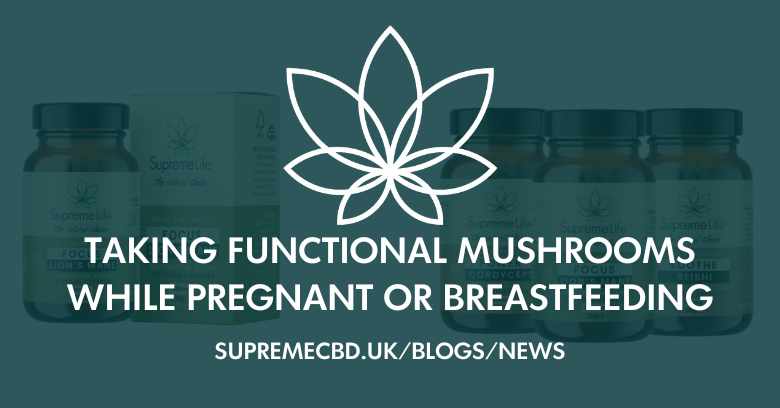
Can I take functional mushrooms while pregnant or breast feeding?
Wondering if it is safe to take functional mushrooms when pregnant or breastfeeding? We cover what you need to know to help you make an informed decision on your wellness journey.
If you’ve heard about the benefits of functional mushrooms for supporting wellbeing as part of a healthy and balanced lifestyle, you may be considering incorporating them into your routine.
Today, you can find a variety of functional mushroom supplements available from capsules chocolate and gummies to powders and drinks, with a variety of different mushrooms including Lion’s Mane, Shiitake, Reishi, Cordyceps, Chaga and more.
However, if you’re pregnant or breastfeeding, there are considerations to keep in mind when thinking about incorporating a new supplement.
Here, Supreme CBD explores what to keep in mind if you are thinking of using functional mushrooms in early motherhood.
Functional Mushroom Safety
Used for thousands of years in countries such as Korea, China and Japan, functional mushrooms are also referred to as nootropics or adaptogenic mushrooms.
These mushrooms are now being utilised for natural wellness across the world including mushrooms such as Lion’s Mane, Turkey Tail, Cordyceps, Chaga, and Reishi.
Given their historic and regular use, functional mushrooms are thought to be safe to consume.
For example, a review which investigated the safety of mushrooms supplements found that there was limited adverse effects and that mushroom supplements are generally considered safe for consumption.
This is because mushroom supplements have a high degree of similarity to the culinary mushrooms such as Shiitake and Maitake, with a wealth of taxological data supporting their safe use.
Cooked, culinary mushrooms are often considered safe to be included as part of a varied and balanced diet during pregnancy, however, functional mushroom supplements are not raw food ingredients.
So, are functional mushrooms safe to consume when pregnant or breastfeeding? Let’s take a look.
Taking functional mushrooms while pregnant or breastfeeding
Carrying out research on supplement safety in pregnant women can be difficult due to health concerns for the baby. However, there have been some studies investigating the ingestion of mushrooms during pregnancy, as well as in animal studies.
For example, one study that looked at women who were ingesting shiitake during pregnancy found there were no changes in maternal weight, biochemical, haematological parameters, organ weight, or reproductive capacity. The study also found no changes in the foetuses' body measurements.
A further study on animals found that reishi consumption had no adverse effects on the foetuses of pregnant mice.
However, research is incredibly limited; therefore, it is generally recommended that you do not use mushroom supplements if you are pregnant or breastfeeding.
Consult a medical professional
If you are pregnant or breastfeeding it is vital to consult a doctor before incorporating any new supplements into your wellness routine.
To date, there is very little scientific research into the use of mushroom supplements therefore it is recommended that they are not consumed by pregnant or breastfeeding women.
A medical professional will be able to advise and guide you on whether a supplement is right for you, as well as advising you on dosage and frequency. While some supplements may be safe to take while pregnant or breastfeeding, taking them in high amounts may cause harm to you or your baby.
Functional mushrooms may also interact with other medications you are taking, so consult your physician before use if you have an existing medical condition or take regular medication.
Beginning motherhood can be an intense time, and looking out for yours and your baby’s health is top priority.
It is important to take extra care about what you put in your body when pregnant or breast feeding, so consulting a medical professional is vital when considering incorporating a new supplement into your routine.